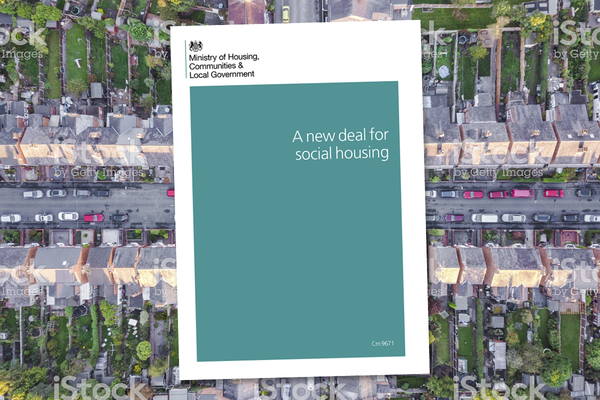You are viewing 1 of your 1 free articles
League tables proposal panned in green paper consultation responses
Sector bodies have condemned the government’s plan for social landlord league tables in their official responses to the Social Housing Green Paper – warning they could increase tenant stigma.
A consultation on the Social Housing Green Paper, published in August, closed yesterday.
The paper, badged as the “most substantial report of its kind for a generation” when it was announced by Sajid Javid last year, made public league tables of providers its flagship recommendation.
But responses from the National Housing Federation (NHF), Chartered Institute of Housing (CIH), the Local Government Association (LGA), G15 and Tpas all attacked the idea.
The NHF response, available here, said: “We have heard from many residents that they do not think league tables will make them feel more empowered or better equipped to hold their landlord to account. Residents cannot – at least not very easily – choose to move to a different landlord if a league table shows their landlord is not performing well. Therefore, this approach has the potential to entrench feelings of stigma among social housing residents.
“While we are very committed to providing meaningful information to residents, and support more regulatory oversight of ‘consumer issues’, we do not think it is possible to develop an approach to league tables that will reflect resident experience, take account of local priorities and circumstances, or take a broader view on how we work with our residents.”
Tpas, which represents tenant participation groups, said the idea of league tables was “essentially pointless”.
It said “meaningful data” should be made available to tenants, but added: “Tpas believes that this data should focus on the individual organisation and should not feed into the production of league tables. The reasons for this are that comparing different organisations is not only problematic, but in a sector where it is often impossible to exercise choice over your landlord, essentially pointless.
“In our consultation with tenants there were also repeated concerns that league tables could end up increasing stigma for some tenants. We do not believe that the production of league tables would help tenants or improve performance, and therefore do not believe that this is the route that government should take.”
The CIH, which represents housing professionals, said in its response: “We do not believe it is either practical or desirable to aggregate a set of performance indicators up into a single league table position. This would be difficult as arguably not all indicators should carry equal weight and tenants of different landlords may have different priorities.
“We are also concerned that a single league table position would be a ‘blunt tool’ by which to judge performance. For either tenants or the regulator to challenge poor performance effectively, it will be important for them to see the full range of performance information available and to understand in which specific areas performance is below the expected level.”
The LGA warned in its response that league tables would not achieve government objectives and are “more likely to have a negative impact driving perverse incentives and reinforcing negative stereotypes and stigma”.
It added that tables “risk being an administrative burden for landlords that adds little value for tenants” and suggested ministers’ focus “should be on improving all services, not comparing them”.
The G15, which represents large London housing associations, added that the response from its residents to league tables have been “lukewarm” and said the idea required “further discussion”.
The Association of Retained Council Housing also said it opposes league tables, while the National Federation of ALMOs questioned whether they would be “useful”.
Simon Dow, interim chair of the Regulator for Social Housing, has previously hit back at critics of league tables saying they had not provided “any compelling case for what to do instead”.
Sector leaders had told Inside Housing they felt league tables could be “blunt” and “counter productive” following the paper’s publication.
Last month, the regulator said league tables would be introduced within two years and compare housing associations, ALMOs and councils equally.
Social Housing Green Paper: full coverage
All our Social Housing Green Paper coverage in one place:
Green paper measures are not enough to create May’s ‘new generation’ of council homes Green paper proposals are welcome but much more is needed to support councils to build, writes John Bibby
Green paper shows ministers now see associations as trusted partners Focusing on the failure of the green paper to address supply misses the point, writes Boris Worrall
Government should focus on building on what is already strong Philippa Jones considers the Social Housing Green Paper through a slightly different lens
We need more than a week of delayed announcements bundled together Jules Birch reflects on the government’s ‘Housing Week’ announcements
The regulator should monitor how associations assist homeless people Government announcements this week are positive, but any enhanced role for the English regulator should include looking at homelessness prevention work, argues David Bogle
The regulator’s role should be limited to dealing with systemic failures Julian Ashby suggests the Housing Ombudsman Service should deal with all complaints
The green paper shows ministers are in listening mode Despite some glaring omissions, the government appears to be in listening mode and it is important the sector takes advantage, argues Emma Maier
A short history of social housing league tables Attempts to create league tables for housing associations are nothing new. Mervyn Jones looks at how they have worked in the past
League tables could prove blunt and counter-productive, sector warns Housing figures criticise government proposals to measure social landlords against performance indicators
Government ‘must decide how proactive regulator should be’ on consumer standards Ministers now face a dilemma over the regulator’s focus, sector figures say
The Green Paper: a golden opportunity missed? Melanie Rees assesses the Social Housing Green Paper against recommendations drawn up by the Chartered Institute of Housing and finds the government comes up short
Longer strategic partnerships and guranteed debt to boost social housebuilding The Social Housing Green Paper outlines key ways of boosting supply
The green paper is remarkable progress but it is still not enough The green paper suggests the government appears to be re-writing much of its policy since 2010, but more needs to be done, writes Jules Birch
Green paper marks a ‘milestone’ on resident involvement The government’s recognition residents need clear information is to be welcomed, now it up to the sector to embrace tenant involvement, writes Paul Hackett
Ministers consider stock transfer programme to community-led associations The stock transfer programme could be revived under proposals in the housing green paper
Access to housing grant could be tied to new league tables Grant could be awarded according to how well landlords meet performance indicators, the paper suggests
Ofsted-style regulation of tenant services proposed The government is considering expanding the Regulator for Social Housing’s remit to intervene over tenant services and give it a more “proactive approach to enforcement”
Government proposes dropping one-for-one Right to Buy replacement commitment A consultation paper published alongside the green paper proposes a broader measurement to replace the one-for-one pledge
A list of recent housing policy U-turns The green paper confirms yet more housing policy U-turns from the government, which has spent the past two years dropping policy ideas developed under the David Cameron government. Here is a rundown of the major changes in policy direction
Sector welcomes green paper but calls for more ‘ambitious investment’ Reaction to the proposals, from the National Housing Federation, Chartered Institute of Housing and more
Morning Briefing: reaction to green paper announcements how the media reported the proposals trailed by the government overnight
Government drops plans to force councils to sell higher-value stock The government drops plans to force councils to sell higher value homes
League tables and ‘sharper teeth’ for regulator in social housing green paper Ministers reveal some of the things in the paper ahead of its publication
Grenfell survivors: green paper does not go far enough survivors of the Grenfell Tower fire have said the measures published in the Social Housing Green Paper do not do enough to rectify issues in the social housing sector
KEY PROPOSALS IN THE SOCIAL HOUSING GREEN PAPER
- New 'league tables' of housing providers based on key performance indicators, surrounding services such as repairs and neighbourhood management. This could be linked to housing grant.
- Consideration to scrapping of the current 'serious detriment' test, to allow 'Ofsted-style' tougher consumer regulation
- New home ownership options such as allowing tenants to buy as little as 1% of their property each year through shared ownership. This would only apply to new shared ownership purchases.
- Ditching of plans to force social landlords to offer fixed term tenancies rather than lifetime tenancies in social housing
- Ditching of plans to force councils to sell off their most valuable social housing when it becomes vacant
- The potential introduction a new stock transfer programme from councils to 'community-led' housing associations
- The return of guaranteed debt funding to help the development of affordable homes, and longer term 'strategic partnerships' for developing housing associations











